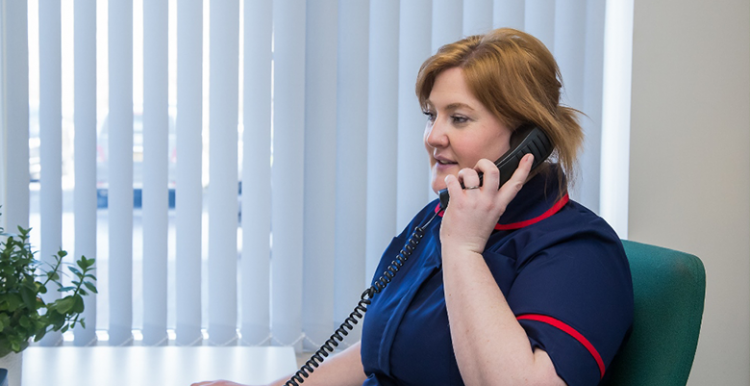Support to help people at the end of life

A new out of hours telephone advice service is supporting people with life limiting conditions in Cambridgeshire and Peterborough.
It's staffed by Clinical Nurse Specialists who answer calls and give expert advice and guidance to all, whether support is already in place, or not.
It's been running for just over nine months, and last week, End of Life Care Programme Manager Clare Moody came along to our Peterborough Health and Care Forum to update us on how this is working for local people.
How the service works
Clare told us the service works across GP and hospital services to support people to stay at home if they can, and prevent avoidable hospital admissions.
The team help with things from symptom control and medication advice to emotional support and carer crisis.
Any adult registered with a GP in Cambridgeshire and Peterborough who is living with, or supporting someone with a life-limiting illness, can use it for free by calling 111 and selecting option 3.
"The beauty of the line is when people call, we take over. We liaise with GPs and professionals so that the person can be with the patient. We communicate with the hospital, GP or district nurse, take on those calls to sort out the situation, and then call back the patient and update them.
We can let them know for example if there’s a prescription to collect from out-of-hours or to expect a call back from a doctor. We take it on for them and almost take the burden off them (family or carers)."
Since it began, the operating hours have changed after looking at what best met the needs of people calling. During weekdays, it now runs from early mornings, about 7am until lunch time. And resumes back from 5pm to midnight. Weekend and bank holiday they run a 24-hour service.
Fact file on the new service
In the nine months since it opened:
- 1,014 patients - or their carers - have contacted the hub for support
- Almost 30% of them were from Peterborough, which is above the average for other areas
- Just over two in five (44%) of people asking for support are living with cancer, the rest have other conditions including dementia, heart and lung disease
- Over half of the people contacting the advice line (55%) were not previously known to palliative care services
- 148 people have avoided a hospital admission
Helping older people self-manage long-term problems after cancer treatment
We also heard from Kumud Kantilal who is working on a project to support older people living with cancer treatment related problems.
Kumud is a Senior Research Associate, at the Applied Research Collaboration (ARC) - this is a partnership between NHS providers, universities, charities, local authorities and other organisations.
They make sure that the findings of research are put into practice so they can start helping people.
Better support for people after cancer treatment
She told us about the DiSCO project (Designing services for cancer in older people) which aims to improve the physical and emotional support cancer patients receive when they come out of treatment.
In a patient survey*, four out our five people (82%) said cancer treatment affected their physical health. And one in three of these patients didn't feel properly supported by the hospital or their care team to manage this.
Seven out of ten (69%) people said the treatment affected their emotional health and of these, only half felt supported by their hospital or care team.
And two in five people (42%) had trouble adjusting to everyday life after cancer treatment.
* A survey of 343 people aged 65+ who'd been treated for breast, prostate or bowel cancer in the East of England. This included patients at North West Anglia Foundation Trust.
“You just fall off the end of a cliff when you come out of treatment”
Patients and family carers got involved in three workshops with researchers and NHS primary care teams to help plan how services could better support people after cancer.
The new service that researchers plan to test
Family doctors will send a questionnaire out to eligible patients to see what needs they may have.
Practices will follow up with all patients - whether they returned their questionnaire or not - to see what health or support needs they may have.
Practices can then treat people, refer or signpost to services to help people manage their physical and emotional health.
The research team are applying for funds from the NHS to test how well this new service works to help people better manage problems after finishing cancer treatment.
Interested in finding out more about DiSCO?
If you want more information or want to be involved in planning and rolling out this new service then please get in touch with Kumud Kantilal via email k.kantilal@uea.ac.uk.

